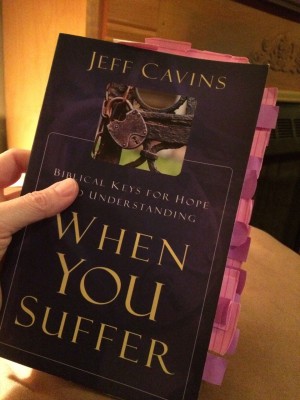"God whispers to us in our pleasures…but shouts in our pain." - C.S. Lewis

Suffering is an unavoidable part of life. Everyone will suffer at one time or another, including those who seem to live a charmed life. As Christians, when we suffer we face a choice: we can suffer in solitude, or we can suffer with Christ. Jeff Cavins tackles the question of how to suffer with Christ in his new book Biblical Keys for Hope and Understanding When You Suffer.
Often, when we come to a great trial in our lives, we can feel as if we are isolated in our distress — that we suffer alone. I know first hand about how great suffering can make you feel utterly alone and how it can lead you to the edge of despair. When I was pregnant with each of my girls, I suffered from debilitating Hyperemesis Gravidarum (HG). For months, I needed as little stimulation as possible to minimize the effects of HG. I did best in a dark and quiet room, resting and sleeping as much as possible. When this happened with my first daughter, I poured myself into prayer, always with the great hope that each day would be the last day of HG. When I was finally free of symptoms at 20 weeks, I felt such gratitude that I would break into tears at the smallest thing, filled with thankfulness to God for what felt like a new life for me.
When I was pregnant with my second daughter and the HG struck again, I was filled with despair and dread. I knew there would be months of suffering, months of taking drugs that made me feel like a zombie so I could keep the HG at bay, months of being sick. Instead of hope, I merely suffered. I felt like I couldn't even pray any more. It was probably the hardest 25 weeks I've ever lived through. The glimmer of hope I felt as I approached the 20 week mark — which was when I stopped being sick with my older daughter — was dashed when I hit and passed that mark without any lessening of my symptoms.
While I'd heard occasional jokes growing up about "offering it up" when something bad happened, no one ever explained the idea to me. In fact, since my mother was a convert, she didn't have any context for it at all. To her, it was just an old wisecrack that Catholics used to say — like an old joke that no one took seriously. Years after my second child was born, a friend introduced me to the idea of offering it up and uniting my suffering with Jesus' suffering on the Cross. I tried to do this, but still didn't understand it very well. Over the years, I've learned a bit more about it, but Jeff Cavins' book has been eye-opening for me.
Cavins talks at length about the idea of suffering from a Biblical perspective. He begins by explaining the difference between physical suffering (pains of the body) and moral suffering (when the very soul hurts). Everyone is familiar with both, but Cavins reminds us that very often, moral suffering is hidden from view; even saints such as Blessed Teresa of Calcutta suffered from times when their souls hurt. Sometimes they even felt so far from God that they couldn't feel His presence or comfort at all. (I had never heard of this, either, when I was growing up. When I read that Mother Teresa suffered a Dark Night of the Soul for close to 40 years, I literally wept. To know that someone I always loved and could recognize, even in my childhood, as a saint could suffer from a Dark Night…it gave me such hope and comfort!) The saints and the Bible both can give us great examples of suffering in this life. St. John Paul II said that suffering has a "passive character" because it happens to us — it's not something we do.
But St. John Paul II also says that our suffering is something unique to each of us. Each of us suffers in a way that is different from every other person in the world. In Salvifici Dolorus, he said, "This means that your suffering is unique and unrepeatable." And what we must do with our sufferings is to unite them with Jesus and offer them to the Father. If the Father was able to bring good out of Jesus' sufferings on the Cross, He can do so with our own sufferings. Cavins recommends that you offer your cross to Jesus and lay it at His feet. For me, this means that I have a mental image of a box containing my problem (or, if it's a person, I lead that person by the hand) which I take to the foot of the Cross. I mentally offer this problem to Jesus, and I leave it at the foot of the Cross.
 I got a lot out of this book, as you can see by my copious sticky notes and highlights!
I got a lot out of this book, as you can see by my copious sticky notes and highlights!
Cavins says that this becomes our gift to God. We give of ourselves, and ask God to do something good with our suffering. Just as God could take Jesus' sacrifice on the Cross and grant salvation to the world, He can take our suffering and grant graces to those around us. This really puts into action the idea of self-giving love. And, as Cavins says in his book, "Self-giving love is not something God does; it is who he is."
There's so much more to When You Suffer that makes this so worth reading, but I want to leave you with what I thought too be the key to suffering and why it happens. (In fact, I highlighted most of the page and wrote "THE KEY" in big letters down the margin of the page when I read it!) Cavins wrote about how we must die to self and give of ourselves completely. Each day, we need to live less for ourselves and more for God (and, in that process, live for and serve others). And he then talks about our ultimate suffering: death. Cavins quotes Archbishop Fulton Sheen when he said, "If death were merely a physical must, we would not fear it; our fear comes from the moral fact that we know we ought not to die. We fear death because it was not part of the original plan laid down for us." And then Sheen brings home how to use our suffering to prepare for death so that we aren't so terribly afraid of it. "Death can be robbed of its greatest show fearfulness if we practice for it. Christianity recommends mortification, penance, and detachment as a rehearsal for the great event. … The basic spiritual principle is this, that death must be conquered in every thought and word and deed by an affirmation of the eternal." (p. 101)
To me, this was the key to truly understanding the idea of "offering it up." We practice offering up our little sufferings now (and doing so cheerfully!) so that we can be ready to offer our entire lives up to God as a sacrifice of love. Even though I had done so much reading on the idea of offering up my aches and pains and suffering, this book has further developed my understanding of the entire concept.
Whether you've been looking into this idea for years or you've never heard of it before, Jeff Cavins can guide you to a deeper understanding of suffering and its role in our lives as Christians. I highly recommend this book, not only for those who might be suffering right now, but also for those who merely know someone who is. The ability to suffer well and live a good life in spite of it is something our world desperately needs today. It's an untapped power for good in the world, and as Christians we need to gain an understanding of it and help others see it, too. By uniting our suffering to Christ's suffering, we can unleash untold graces on the world.
Your purchase of this book through our Amazon link supports CatholicMom.com!
Photos and text © Christine Johnson
About the Author

Christine Johnson
Christine Johnson has been married to Nathan since 1993 and is the mother of two homeschool graduates. She and Nathan live in the Blue Ridge Mountains of Southwest Virginia, where she tries to fit in as a transplanted Yank. She blogs at Domestic Vocation about her life as a wife, mother, and Lay Dominican.


.png?width=1806&height=731&name=CatholicMom_hcfm_logo1_pos_871c_2728c%20(002).png)
Comments